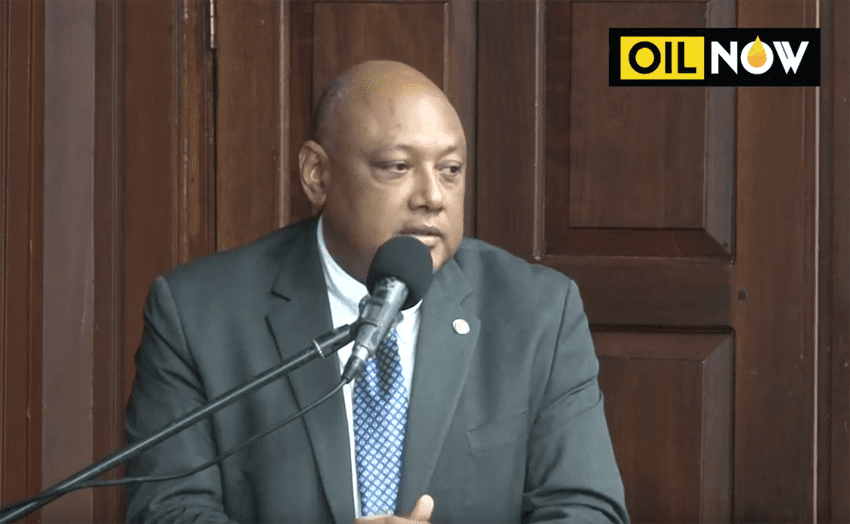Guyana’s Minister of Natural Resources, Raphael Trotman, said Thursday that the updated petroleum agreement arrived at between US oil major ExxonMobil and the South American Country in 2016 represents a ‘hybrid model’ that combines a production share and royalty based arrangement. This Mr. Trotman said allows for Guyana to “enjoy the best of both worlds.”
The natural resources minister was speaking at the time at the unveiling of the petroleum agreement the country has entered with ExxonMobil affiliate Esso Exploration and Production Guyana Ltd, Hess and CNOOC Nexen.
Commenting on criticism that the 2 percent royalty Guyana is set to receive when production begins in 2020 is not enough, Mr. Trotman said, “Firstly there are different types of contracts, there is the production share or profit sharing contract which is what we inherited in 1999 and there is also the royalty based contract. We were already receiving 50% of the profits as an equal partner having not sunk a single cent into the development of the block, we however decided that we would come up with a hybrid of that production sharing agreement and put a feature of a royalty on top of that.”
ExxonMobil will have an initial 20-year period to produce petroleum under the production license granted by Guyana in August for the Liza Phase 1 development project, with a single renewal period of up to 10 years thereafter.
Article 15 of the Petroleum Agreement states that the company shall pay, either in cash or kind “a royalty of 2 percent of all petroleum produced and sold, less the quantities of petroleum used for fuel or transportation in petroleum operations from all production licenses subject to the agreement.”
Many countries, Mr. Trotman said, “…either have the production share or the royalty based; we decided that we will try to enjoy the best of both worlds and were successful in convincing Exxon even though there was no legal basis upon which they can pursue because there was no frustration of contract, no breach of contract. The only thing that changed was a discovery and a change of government.”
The contract, he pointed out, is a “is a binding lawful contract which Exxon has the right to enforce should we decide not to accept it.”
He said for strategic and other reasons the Guyana government chose not to enter into a full renegotiation of the contract. “So based on our efforts and by calculations we can now receive on a daily basis when production commences in 2020 close to 1 million US dollars per day,” he said, confirming an earlier report by OilNOW which provided similar tabulations.
“So at the end of the year Guyana will be earning about 300 million US dollars which is as a result of what some may determine to be a modest royalty rate, but it is significant because this is money that does not come from a grant or a loan…this is money that will come to us on a daily basis,” Mr. Trotman further added.
In accordance with Guyana’s Petroleum (Exploration and Production) Act No.3 of 1986, under guidelines for Production Sharing, the contractor – in this case ExxonMobil Guyana and its partners – shall be allowed to share the profit oil with the Government of Guyana on a basis no less than 50% per field. The company can enjoy a maximum or a ceiling of 75% of recoverable costs per month. This cost recovery will only obtain until the initial investment cost is cleared. After this period, Guyana can expect to receive more revenue from its share of profit oil.




